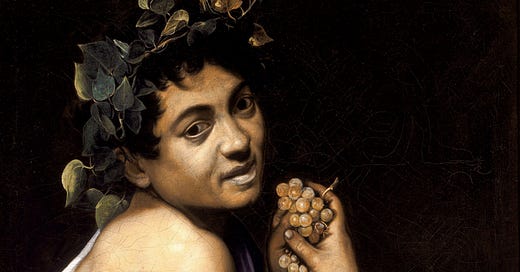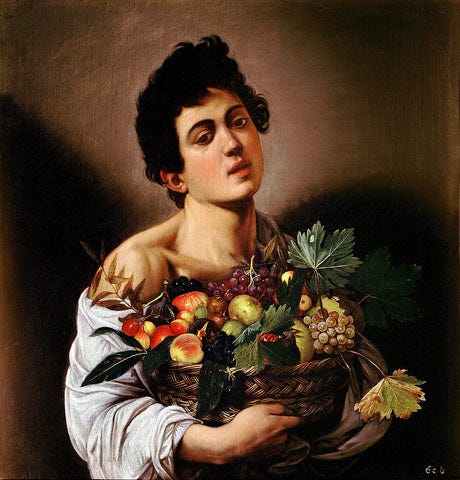In the 1960s, Cheever got weird(er). He wrote meta-stories like “A Miscellany of Characters That Will Not Appear” and re-write Ovid for the 20th century with “Metamorphoses.” He'd play with time and place in “The Swimmer.” This 1959 story ushered in the era of heavy symbolism and experimentation.
Caravaggio's “Young Sick Bacchus” most likely inspired this story. Imagine Cheever staring at the jaundiced Bacchus barely holding up his head while peaches rot near him. As a drunk in his 40s, that Bacchus spoke to him. Teenagers and young adults may spend their weekends happily intoxicated. Keep binge drinking into your 30s and 40s and it gets sad. Friends avoid you. You act stupid. Family members stop inviting you to parties. You can only socialize with drunks. The hangovers get worse. Your throat burns. The doctor tell to cut down. You lie about how often you drink; you're not fooling anyone.
The Bacchus of Caravaggio is still the god of wine, but also the god of consequences – the hangover, the damaged liver, the lonely mornings. He's smiling but he's sad. The party has gone on too long. He wants to keep going but only because he can't go home. He can't even eat the grapes. The peaches look rotten.
Like Cheever with that painting, Charlie Folkestone becomes obsessed with his new neighbors – Gee-Gee (stands for Greek God) and Peaches, his wife. From the moment they move in next door with the titular scarlet moving van, they control his imagination. Charlie and wife invite them over. After a few drinks, Gee-Gee is getting naked and calling Charlie and wife stuffy. Peaches begs him to stop, but she's as effective as literal peaches.
After this disaster, Charlie should avoid Gee-Gee, but he's trapped. Gee-Gee is sociable in the daytime, but at night, he's the worst party guest. He's Bacchus the destroyer. He will break plates. He will scream and take off his clothes. He just wants to teach them. Charlie can't look away. At first, Cheever doesn't explain why.
This story is reminiscent of Kevin Can Go F--- Himself. Gee-Gee's antics are very funny if you don't have to deal with him. Most families of the unincorporated townships of B----- can laugh at the story of the night Gee-Gee destroyed some poor schmuck's dining room. Only those forced to deal with Gee-Gee know that he's a burden. Gee-Gee is a funny guy unless you consider how often Peaches has had to clean up after him.
Charlie is too wrapped up in Gee-Gee's life to sit on the sidelines laughing. As the story progresses, Charlie sees Gee-Gee at the train station and marvel's at Gee-Gee's sober charisma. Every time Gee-Gee is at a party, Charlie watches in sick fascination. Peaches calls him over after a fight and when he arrives he asks Gee-Gee if he will go on the wagon, go to a psychiatrist, stop drinking.
Charlie is not asking these questions because he cares about Gee-Gee. Charlie wants to know if there's hope for him. That's why Charlie asks “Will you go on the wagon if I go on the wagon?” and “Will you go to the psychiatrist if I go with you?” Charlie wants a reason to get help, but Gee-Gee won't save Charlie. Bacchus does not save everyone from themselves. If Bacchus leads you through the woods, you'll end up with your head on a stick. It's fun to visit a bacchanal. It's tragic to live in one.
Even after the scarlet moving van returns and takes Gee-Gee to a shabbier place, Charlie calls him. When Charlie visits, Peaches is out of town. Gee-Gee is in a cast and cant' even afford a wheel chair. Instead, he moves around in a wagon. Charlie stays too long. He barely gets home in the snow. He arrives home to Gee-Gee calling to beg him to come back and help. Gee-Gee fell out of the wagon.
This tears Charlie up. By this point, Charlie sees his future in Gee-Gee. If Charlie doesn't come back, who will help Charlie when he's falling down drunk? He honestly considers driving back. He even worries that his wife will insist that he go back to help Gee-Gee, even though no wife would want their husband to risk life and limb to help the embarrassing alcoholic ex-neighbor. Charlie won't save Gee-Gee. Charlie won't save Charlie. When the local priest asks about him, Charlie threatens the priest. Charlie's Bacchus worship concludes with Charlie losing his job and his house and the scarlet moving van.
Meanwhile Gee-Gee is Gee-Gee, always fine, always wasted, never learning. Gee-Gee called the fire department and after they put him back in the wagon, they stayed over and everyone ate steaks and drank. Like Bacchus, Gee-Gee knows how to entertain. As long as you keep your distance, Gee-Gee is great fun.
If you like this substack, please feel free to get a paid subscription or contribute to my gofundme.
For more about Drunk Cheever, check out Parthenope, by the show runner of The Young Pope.
Michael Hemmingson also wrote stories about doomed drunks. Buy a copy of This Other Eden.





